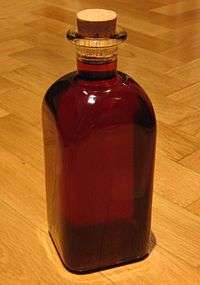Patxaran


Patxaran (Basque pronunciation: [patʃaɾan]) (Basque from paitar, pattar "liquor" and aran "sloe" (in certain Basque dialects)[1] Spanish: Pacharán) is a sloe-flavoured liqueur commonly drunk in Navarre and the Basque Country, the Pyrenees and in Spain. It is usually served as a digestif either chilled or on ice.
Process
Patxaran is made by soaking sloe fruits, collected from the blackthorn shrub, along with a few coffee beans and a cinnamon pod in anisette, for one to eight months.[2] The process produces a light sweet reddish-brown liquid around 25-30% in alcohol content by volume. In addition to dictating the amount of sloes to be used, the regulating body for Pacharán Navarro insists that no colourings or flavourings be added and that the maceration last between one and eight months.
History
Known to have existed in Navarre as early as the Middle Ages, Patxaran was initially a home-made liqueur of rural Navarre and became popular during the late 19th century. It was commercialised in the 1950s and then became very popular outside Navarre. One theory for this rise holds that young Navarrese took bottles with them while on National service, thereby popularising Patxaran throughout Spain. Currently, there are moves to ensure that the drink's name will be protected in order to ensure its quality, tradition and Navarrese identity.
Commercial brands and production
First sold in 1956, the oldest commercial brand is Zoco, founded by the family of Ambrosio Velasco, who had been producing patxaran in the Viana area since 1816. This brand is now owned by Diego Zamora Group. Other brands are Etxeko, Kantxa, Barañano Atxa, Basarana, "Berezko", "Usua", "La Navarra", and Baines.
Seven million litres a year are commercially produced.
See also
References
- ↑ "aran". Orotariko Euskal Hiztegia. Euskaltzaindia. Retrieved 23 March 2013.
- ↑ Nickles, Jane (2015). 2015 Certified Specialist of Spirits Study Guide. Society of Wine Educators. p. 91. ASIN B00RWS7ONE.